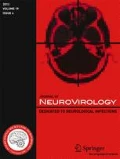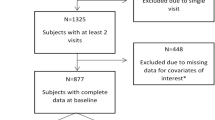Abstract
Progress in treatments has led to HIV+ patients getting older. Age and HIV are risk factors for neurocognitive impairment (NCI). We explored the role of cognitive reserve (CR) on cognition in a group of virologically suppressed older HIV+ people. We performed a multicenter study, consecutively enrolling asymptomatic HIV+ subjects ≥60 years old during routine outpatient visits. A comprehensive neuropsychological battery was administered. Raw test scores were adjusted based on Italian normative data and transformed into z-scores; NCI was defined according to Frascati criteria. All participants underwent the Brief Intelligence Test (TIB) and the Cognitive Reserve Index (CRI) questionnaire as proxies for CR. Relationships between TIB, CRI, and NCI were investigated by logistic or linear regression analyses. Sixty patients (85 % males, median age 66, median education 12, 10 % HCV co-infected, 25 % with past acquired immunodeficiency syndrome (AIDS)-defining events, median CD4 cells count 581 cells/μL, median nadir CD4 cells count 109 cells/μL) were enrolled. Twenty-four patients (40 %) showed Asymptomatic Neurocognitive Impairment. At logistic regression analysis, only CRI (OR 0.94; 95 % CI 0.91–0.97; P = 0.001) and TIB (OR 0.80; 95 % CI 0.71–0.90; P < 0.001) were associated with a lower risk of NCI. Higher CRI and TIB were significantly correlated with a better performance (composite z-score) both globally and at individual cognitive domains. Our findings highlight the role of CR over clinical variables in maintaining cognitive integrity in a virologically suppressed older HIV-infected population. A lifestyle characterized by experiences of mental stimulation may help to cope aging and HIV-related neurodegeneration.
Similar content being viewed by others
References
Antinori A, Arendt G, Becker JT, Brew BJ, Byrd DA, Cherner M, Clifford DB, Cinque P, Epstein LG, Goodkin K, Gisslen M, Grant I, Heaton RK, Joseph J, Marder K, Marra CM, McArthur JC, Nunn M, Price RW, Pulliam L, Robertson KR, Sacktor N, Valcour V, Wojna VEJT (2007) Updated research nosology for HIV-associated neurocognitive disorders. Neurology 69:1789–1799
Barnett JH, Salmond CH, Jones PB, Sahakian BJ (2006) Cognitive reserve in neuropsychiatry. Psychol Med 36:1053–1064
Basso MR, Bornstein RA (2000) Estimated premorbid intelligence mediates neurobehavioral change in individuals infected with HIV across 12 months. J Clin Exp Neuropsychol 22:208–218
Capitani E, Laiacona M (1997) Composite neuropsychological batteries and demographic correction: standardization based on equivalent scores, with a review of published data. The Italian group for the neuropsychological study of ageing. J Clin Exp Neuropsychol 19:795–809
Carlesimo GA, Caltagirone C, Gainotti G (1996) The mental deterioration battery: normative data, diagnostic reliability and qualitative analyses of cognitive impairment. The group for the standardization of the mental deterioration battery. Eur Neurol 36:378–384
Castellon SA, Hardy DJ, Hinkin CH, Satz P, Stenquist PK, van Gorp WG, Myers HF, Moore L (2006) Components of depression in HIV-1 infection: their differential relationship to neurocognitive performance. J Clin Exp Neuropsychol 28:420–437
Chang L, Holt JL, Yakupov R, Jiang CS, Ernst T (2013) Lower cognitive reserve in the aging human immunodeficiency virus-infected brain. Neurobiol Aging 34:1240–1253. doi:10.1016/j.neurobiolaging.2012.10.012
Ciccarelli N, Fabbiani M, Colafigli M, Trecarichi EM, Silveri MC, Cauda R, Murri R, De Luca A, Di Giambenedetto S (2013) Revised central nervous system neuropenetration-effectiveness score is associated with cognitive disorders in HIV-infected patients with controlled plasma viraemia. Antivir Ther 18:153–160. doi:10.3851/IMP2560
Cole MA, Castellon SA, Perkins AC, Ureno OS, Robinet MB, Reinhard MJ, Barclay TR, Hinkin CH (2007) Relationship between psychiatric status and frontal-subcortical systems in HIV-infected individuals. J Int Neuropsychol Soc 13:549–554
Colombo L, Sartori G, Brivio C (2002) Stima del quoziente intellettivo tramite l’applicazione del TIB (Test Breve di Intelligenza). G Ital Psicol 613–638
Dufouil C, Alperovitch A, Tzourio C (2003) Influence of education on the relationship between white matter lesions and cognition. Neurology 60:831–836
Elkins JS, Longstreth WT Jr, Manolio TA, Newman AB, Bhadella RA, Johnston SC (2006) Education and the cognitive decline associated with MRI-defined brain infarct. Neurology 67:435–440
Fabbiani M, Ciccarelli N, Tana M, Farina S, Baldonero E, Di Cristo V, Colafigli M, Tamburrini E, Cauda R, Silveri MC, Grima P, Di Giambenedetto S (2013) Cardiovascular risk factors and carotid intima-media thickness are associated with lower cognitive performance in HIV-infected patients. HIV Med 14:136–144. doi:10.1111/j.1468-1293.2012.01044.x
Fabbiani M, Grima P, Milanini B, Mondi A, Baldonero E, Ciccarelli N, Cauda R, Silveri MC, De Luca A, Di Giambenedetto S (2014) Antiretroviral neuropenetration scores better correlate with cognitive performance of HIV-infected patients after accounting for drug susceptibility. Antivir Ther. doi:10.3851/IMP2926
Foley JM, Ettenhofer ML, Kim MS, Behdin N, Castellon SA, Hinkin CH (2012) Cognitive reserve as a protective factor in older HIV-positive patients at risk for cognitive decline. Appl Neuropsychol Adult 19:16–25. doi:10.1080/09084282.2011.595601
Glatt SL, Hubble JP, Lyons K, Paolo A, Tröster AI, Hassanein RE, Koller WC (1996) Risk factors for dementia in Parkinson’s disease: effect of education. Neuroepidemiology 15:20–25
Gunning-Dixon FM, Brickman AM, Cheng JC, Alexopoulos GS (2009) Aging of cerebral white matter: a review of MRI findings. Int J Geriatr Psychiatry 24:109–117. doi:10.1002/gps.2087
Hammond ER, Crum RM, Treisman GJ, Mehta SH, Marra CM, Clifford DB, Morgello S, Simpson DM, Gelman BB, Ellis RJ, Grant I, Letendre SL, McArthur JC, CHARTER Group (2014) The cerebrospinal fluid HIV risk score for assessing central nervous system activity in persons with HIV. Am J Epidemiol 180:297–307. doi:10.1093/aje/kwu098
Heaton RK, Clifford DB, Franklin DR Jr, Woods SP, Ake C, Vaida F, Ellis RJ, Letendre SL, Marcotte TD, Atkinson JH, Rivera-Mindt M, Vigil OR, Taylor MJ, Collier AC, Marra CM, Gelman BB, McArthur JC, Morgello S, Simpson DM, McCutchan JA, Abramson I, Gamst A, Fennema-Notestine C, Jernigan TL, Wong J, Grant I, CHARTER Group (2010) HIV-associated neurocognitive disorders persist in the era of potent antiretroviral therapy: CHARTER Study. Neurology 75:2087–2096. doi:10.1212/WNL.0b013e318200d727
Kesler SR, Adams HF, Blasey CM, Bigler ED (2003) Premorbid intellectual functioning, education, and brain size in traumatic brain injury: an investigation of the cognitive reserve hypothesis. Appl Neuropsychol 10:153–162
Letendre S, Fitzsimons C, Ellis RJ, Clifford D, Collier AC, Gelman B, Marra C, McArthur J, McCutchan JA, Morgello S, Simpson D, Vaida F, Heaton R, Grant I and the CHARTER Group (2010) Correlates of CSF viral loads in 1,221 volunteers of the CHARTER cohort. 17th Conference on Retroviruses and Opportunistic Infections, 16–19 February, San Francisco, CA, USA, Abstract 172
Malaspina L, Woods SP, Moore DJ, Deep C, Letendre SL, Jeste D, Grant I, HIV Neurobehavioral Research Programs (HNRP) Group (2011) Successful cognitive aging in persons living with HIV infection. J Neurovirol 17:110–119. doi:10.1007/s13365-010-0008-z
Morgan EE, Woods SP, Smith C, Weber E, Scott JC, Grant I, HIV Neurobehavioral Research Program (HNRP) Group (2012) Lower cognitive reserve among individuals with syndromic HIV-associated neurocognitive disorders (HAND). AIDS Behav 16:2279–2285. doi:10.1007/s10461-012-0229-7
National Cholesterol Education Program (NCEP) Expert Panel on Detection, Evaluation, and Treatment of High Blood Cholesterol in Adults (Adult Treatment Panel III) (2002) Third report of the national cholesterol education program (NCEP) expert panel on detection, evaluation, and treatment of high blood cholesterol in adults (adult treatment panel III) final report. Circulation 106:3143–3421
Nucci M, Mapelli D, Mondini S (2011) Cognitive Reserve Index questionnaire (CRIq): a new instrument for measuring cognitive reserve. Aging Clin Exp Res 24:218–226. doi:10.3275/800
Patel SM, Thames AD, Arbid N, Panos SE, Catellon S, Hinkin CH (2013) The aggregate effects of multiple comorbid risk factors on cognition among HIV-infected individuals. J Clin Exp Neuropsychol 35:421–434. doi:10.1080/13803395.2013.783000
Pereda M, Ayuso-Mateos JL, Gomez Del Barrio A, Echevarria S, Farinas MC, Garcia Palomo D, Gonzáles Macias J, Vázquez-Barquero JL (2000) Factors associated with neuropsychological performance in HIV-seropositive subjects without AIDS. Psychol Med 30:205–217
Robertson IH (2013) A noradrenergic theory of cognitive reserve: implications for Alzheimer’s disease. Neurobiol Aging 34:298–308. doi:10.1016/j.neurobiolaging.2012.05.019
Robertson IH (2014) Right hemisphere role in cognitive reserve. Neurobiol Aging 35:1375–1385. doi:10.1016/j.neurobiolaging.2013.11.028
Sacktor N, Lyles RH, Skolasky R, Kleeberger C, Selnes OA, Miller EN, Becker JT, Cohen B, McArthur JC, Multicenter AIDS Cohrt Study (2001) HIV-associated neurologic disease incidence changes: multicenter AIDS cohort study, 1990–1998. Neurology 56:257–260
Sacktor N, Skolasky R, Selnes OA, Watters M, Poff P, Shiramizu B, Shikuma C, Valcour V (2007) Neuropsychological test profile differences between young and old human immunodeficiency virus-positive individuals. J Neurovirol 13:203–209
Satz P, Morgenstern H, Miller EN, Selnes OA, McArthur JC, Cohen BA, Wesch J, Becker JT, Jacobson L, D’Elia LF, van Gorp W, Visscher B (1993) Low education as a possible risk factor for cognitive abnormalities in HIV-1: findings from the multicenter AIDS Cohort Study (MACS). J Acquir Immune Defic Syndr 6:503–511
Stern RA, Silva SG, Chaisson N, Evans DL (1996) Influence of cognitive reserve on neuropsychological functioning in asymptomatic human immunodeficiency virus-1 infection. Arch Neurol 53:148–153
Stern Y (2002) What is cognitive reserve? theory and research application of the reserve concept. J Int Neuropsychol Soc 8:448–460
Stern Y (2013) Cognitive reserve: implications for assessment and intervention. Folia Phoniatr Logop 65:49–54. doi:10.1159/000353443
Sumowski JF, Wylie GR, Deluca J, Chiaravalloti N (2010) Intellectual enrichment is linked to cerebral efficiency in multiple sclerosis: functional magnetic resonance imaging evidence for cognitive reserve. Brain 133:362–374. doi:10.1093/brain/awp307
Tozzi V, Balestra P, Bellagamba R, Corpolongo A, Salvatori MF, Visco-Comandini U, Vlassi C, Giulianelli M, Galgani S, Antinori A, Narciso P (2007) Persistence of neuropsychologic deficits despite long-term highly active antiretroviral therapy in patients with HIV-related neurocognitive impairment: prevalence and risk factors. J Acquir Immune Defic Syndr 45:174–182
Valcour V, Paul R, Chiao S, Wendelken LA, Miller B (2011) Screening for cognitive impairment in human immunodeficiency virus. Clin Infect Dis 53:836–842. doi:10.1093/cid/cir524
Valcour V, Shikuma C, Shiramizu B, Poff P, Watters M, Selnes O, Holck P, Grove J, Sacktor N (2004) Higher frequency of dementia in older HIV-1 individuals: the Hawaii aging with HIV-1 cohort. Neurology 63:822–827
Wendelken LA, Valcour V (2012) Impact of HIV and aging on neuropsychological function. J Neurovirol 18:256–263. doi:10.1007/s13365-012-0094-1
Wilson RS, Nag S, Boyle PA, Hizel LP, Yu L, Buchman AS, Schneider JA, Bennett DA (2013) Neural reserve, neuronal density in the locus ceruleus, and cognitive decline. Neurology 80:1202–1208. doi:10.1212/WNL.0b013e3182897103
Acknowledgments
The authors want to thank all the study’s participants.
Preliminary results of this work were previously presented as poster at the Conference on Retroviruses and Opportunistic Infections (CROI), Seattle, Washington, USA, February 23–26, 2015.
Author information
Authors and Affiliations
Corresponding author
Ethics declarations
Conflict of interest
No specific funding was received for this study. MF received speakers’ honoraria from Abbott Virology, Merck Sharp & Dohme, and Janssen-Cilag. RC has been advisor for Gilead, Janssen-Cilag, and Basel Pharmaceutical, received speakers’ honoraria from ViiV, Bristol-Myers Squibb, Merck Sharp and Dohme, Abbott, Gilead, and Janssen-Cilag, and research support from “Fondazione Roma.” SDG received speakers’ honoraria and support for travel meetings from Gilead, Bristol-Myers Squibb, Abbott, Boehringer Ingelheim, Janssen-Cilag, and GlaxoSmithKline. All the other authors declare that they have not conflict of interest.
Electronic supplementary material
Below is the link to the electronic supplementary material.
ESM 1
(DOC 87.5 kb)
Rights and permissions
About this article
Cite this article
Milanini, B., Ciccarelli, N., Fabbiani, M. et al. Cognitive reserve and neuropsychological functioning in older HIV-infected people. J. Neurovirol. 22, 575–583 (2016). https://doi.org/10.1007/s13365-016-0426-7
Received:
Revised:
Accepted:
Published:
Issue Date:
DOI: https://doi.org/10.1007/s13365-016-0426-7




